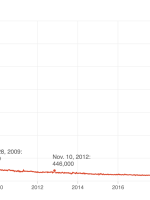Customer loyalty programs have been around for years. You think nothing of giving the supermarket or pet supply store your personal information. In exchange you get a card or a key ring tag that you present at checkout to get a discount.
Now wireless carriers are taking it a step further, raising alerts from privacy advocates.
Verizon and AT&T recently launched programs allowing customers to receive rewards based on information their smartphones share with the carriers.
Verizon's program, called Verizon Selects, "will use location, web browsing and mobile application usage data, as well as other information including customer demographic and interest data, to create specific insights" about customers, Torod Neptune, vice president of corporate communications for Verizon Wireless, said on the company's website.
"Verizon Selects analyzes this information about customers to see whether they fit into certain audiences Verizon or third party marketers are trying to reach," Neptune said. "Depending on the results, participating customers will receive marketing messages or offers that may be of more interest to them than what they see or receive today."
AT&T said its program, called AT&T Alerts, will use "geo-location technology" to offer customers "discounts, rewards and offers via text message when they are near participating retailers and brands," including Gap, Staples and Zales.
GigaOM gives this example: "If you're approaching a Gap, for example, AT&T ships you [a] text message out of the blue with a link to a coupon for jeans."
Both AT&T and Verizon say the programs will work on an opt-in basis — only customers who choose to participate will do so. And they emphasize that they won't share personal information with other companies. Verizon said it will offer the program to some of its customers, in what GigaOM described as a pilot program, while AT&T has a sign-up page.

"It's important to remember that Verizon DOES NOT share information that identifies customers personally outside of Verizon," Verizon said.
On its website, AT&T said, "Your personal information will not be used outside of the AT&T Alerts program." And its terms of use point to the company's privacy policy, which says, "We do not provide Personal Information to non-AT&T companies for the marketing of their own products and services without your consent."
But privacy groups say such programs are deceptive and potentially illegal.
"Users' location data, web browsing histories, internet search terms, demographic information, and mobile device usage information are often personally identifiable," the Electronic Privacy Information Center said in an October 2011 complaint with the Federal Trade Commission regarding Verizon's business practices.
"Verizon Wireless's collection and disclosure of this personal information violates user expectations, diminishes user privacy, and contradicts Verizon Wireless's own representations," EPIC said in the complaint. "These business practices are Unfair and Deceptive Trade Practices ..."
And the Electronic Frontier Foundation says that even the practice of aggregating personal data can violate privacy provisions. As CNET reported in October 2012:
"Hanni Fakhoury, a staff attorney at the in San Francisco, said a wireless carrier that discloses information about which URLs a customer visits could run afoul of the Wiretap Act. In general, the law says, carriers may not 'divulge the contents of any communication.'
" 'I don't see any substantive difference between collecting content from one person and turning it over to someone, and collecting it from multiple people, aggregating that information and then turning the aggregated data over to someone else,' Fakhoury says. 'In the end, there is still a capturing of content from the user at some point — and that's what the potential (Wiretap Act) problem is.' "
In addition to Verizon Selects, the company offers businesses a program called Precision Market Insights, which it describes on its site:
"Our solutions capture information from the physical and digital worlds simultaneously to deliver unparalleled audience and location measurement, mobile marketing and predictive analytics based on what audiences actually do, where they actually go and what they actually like."
Verizon tells retailers the data can be used to "drive sales by enhancing customer satisfaction":
"Using location data, mobile-browsing trends and location-specific analytics, you can now determine what your customer base really looks like and how to best serve them. Our tools can help you provide a more targeted retail experience to meet consumers' wants and needs in a specific area."
Copyright 2020 NPR. To see more, visit https://www.npr.org.



